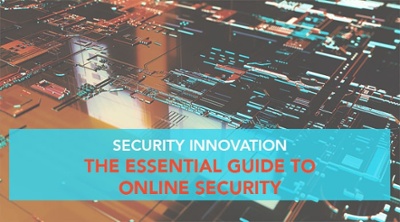October is National Cyber Security Awareness Month (NCSAM). Our personal and professional lives are more than ever entwined in technology. Our online awareness and security posture needs solid footing to ensure our cybersecurity knowledge and actions are up to speed. Security Innovation is proud to be an official champion of NCSAM. We have complied a whole bunch of tools and resources to keep you safe and secure whenever and wherever you are connected.
Get Our Helpful Online Resource: The NSCAM ToolKit. Click on image.

The dangers of being unaware of necessary security measures abounds in the workplace with potential problems such as leaked or stolen customer or employee records, fraud, stolen business data, regulatory compliance mishaps and fines, and many other unwanted circumstances. Everyone can participate to ensure that not only their company's business dealings stay safe and secure, but their family and personal information as well.
While I have worked in the Technology field for quite a while now, as far as security goes, I’m a "newbie." I now find myself gravitating towards articles on flaws being found in all kinds of data gathering systems from voting banks to retail, smart home hacks and the prevalent social media hacks, but what does this really mean from a technical aspect and how concerned should I really be? And really, what can the average computer user do to keep secure?
After a little research, I came upon some good starter suggestions from our engineers, on how to get and stay safe in the workplace.
Depending on what system you use at home and or in the office, the following suggestions should get you started on the correct path to improving your online security posture:
Mac/OS X Operating System - Get our Mac Safety Guide
- Enable Gatekeeper and only install apps from the Apple store
- Do not run any apps that ask for your admin login or credentials to run
- Enable a firewall
- Use a lock screen password – make it strong and change from time-to-time
- Disable iCloud storage when you don’t want to store sensitive data in the cloud
- Use an encrypted external drive for time machine backups
- Enable “Find my Mac” and test before you need it
PC Safety - Get our PC Safety Guide
- Make sure you are using the latest version of Windows
- Turn on automatic updates and make sure your computer is regularly updated
- Enable a firewall
- Disable the Windows 10 keylogger
- Disable cloud features when concerned about sensitive data storage
- Schedule regular system restore points and use encrypted external drives for backups
Browser Safety - Get our Browser Safety Guide
- Use the most modern and up-to-date browser such as Chrome or FireFox
- Always, always, log-out of any online service when you are done
- Always use two-factor authentication log-in for any sites containing sensitive personal data
- Ensure that SSL/TLS encryption is enabled on all sites you are logged into as well as on those where you are submitting any personal information to
- On a shared or public computer? Always use incognito or private browsing mode
- Regularly check to make sure no additional browser extension or add-ons have been installed
- Limit the number of browser extensions you use and only install from trusted sources
Make it a goal to apply these safety tips before the end of the month and you will be on your way to a more secure online working environment.
You can always get more online security information and keep Security Innovation's Essential Guide to Online Security as a handy resource:


